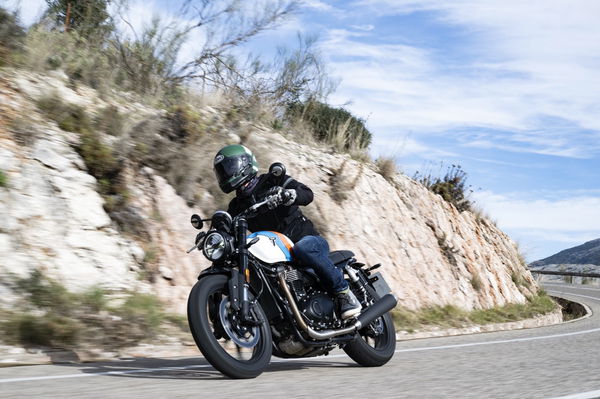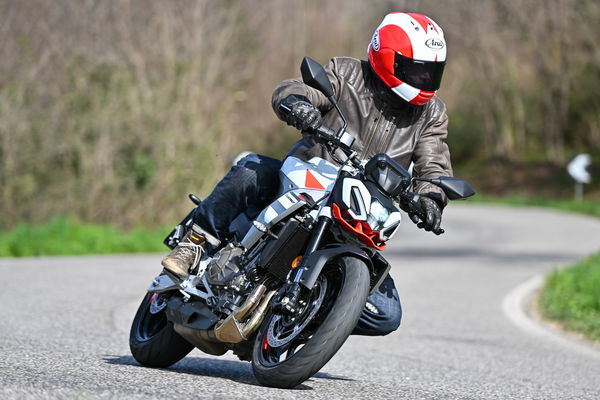2025 Honda CB1000 Hornet Review: The Best Value Naked?
Honda has launched its new range-topping naked bike, the CB1000 Hornet which features a retuned engine from the CBR1000RR
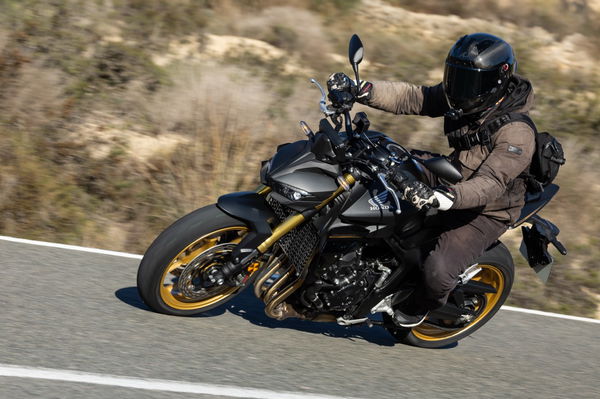
It was EICMA 2023 when Honda first revealed the concept for the CB1000 Hornet, and it looked sweet, with about the right kit on it, and with an engine that is widely regarded as one of the best inline four-cylinder units of the late 2010s.
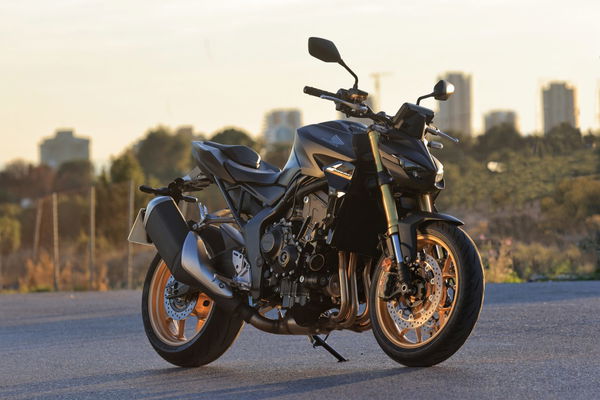
But then the bike seemed to drop off the radar, and people (well, just me actually) started to wonder if Honda had canned the project altogether. Thank god they didn’t, as we’ve been out riding it at the press launch in Spain, and it is an absolute belter of a super naked.
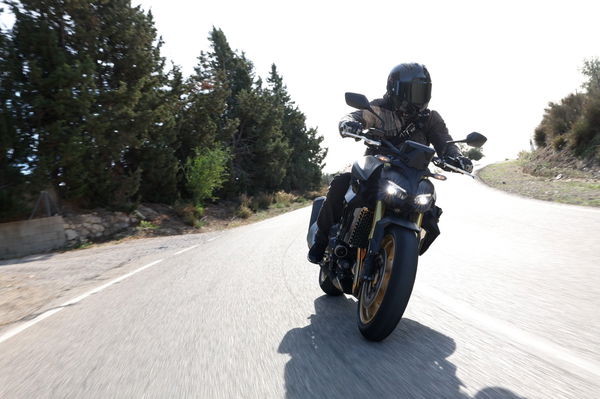
We’ve spent around 110 miles on the bike, riding mostly tight and twisty mountain roads over here in sunny Benidorm. We did manage some faster, more flowing stuff late in the afternoon and even the occasional squirt at motorway speeds. It’s been dry, warm and sunny. If you looked up the phrase ‘perfect day to ride a motorcycle’, this would be it.
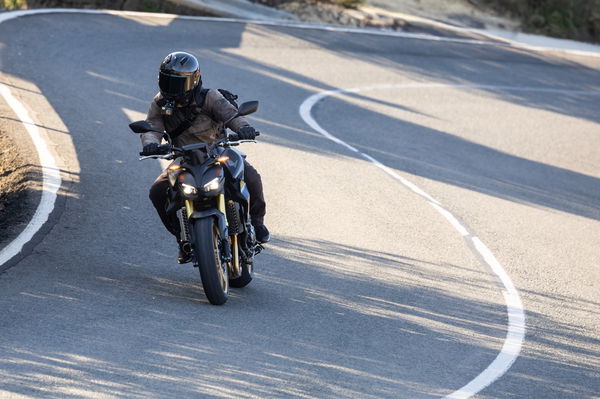
What’s the CB1000 Hornet all about?
Honda’s new Hornet thousand is effectively a rethink of the CB1000R platform. That bike handled fantastically, had a beautiful engine, and was gorgeous to look at, but it never quite sold in the numbers that it should have. Enter the CB1000 Hornet, a ground-up rethink of what a 1,000cc Honda naked bike should be.
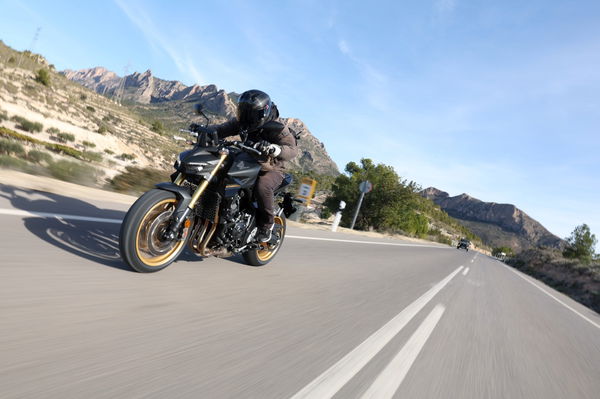
Is anything shared with the CB1000R? No, not really. It’s new from the frame out and fitted with an engine sourced from the 2017 Fireblade, it has completely different geometry, new bodywork, suspension, and brakes.
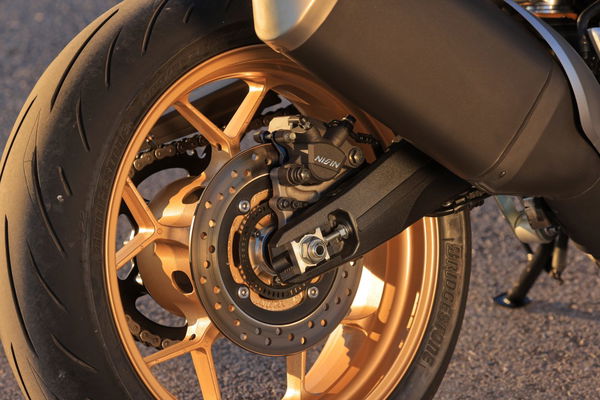
Power for the SP, which is the only version I’ve ridden, is 155bhp at 11,000rpm, while peak torque is 78lb ft and arrives at 9,000rpm. You’ve got a ride-by-wire throttle, three modes (Rain, Road, Sport) and two user-configurable modes. The stock Hornet thousand is the same on all those fronts but makes 148bhp and 76lb ft of torque. The changes in the engine of both the Hornet and SP includes new pistons, revised valve timing and lift, downdraft inlets, a new airbox and mapping, and the addition of an exhaust valve on the SP that changes the sound a bit and helps the engine to breathe.
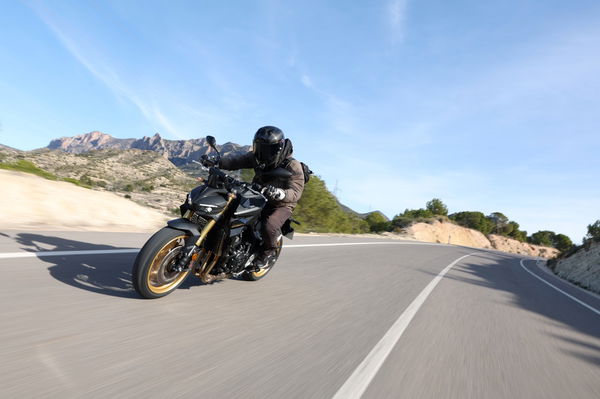
There are some other differences between the two bikes when we look at the chassis, with one of the biggest being the suspension. Both bikes get Showa 41mm Separate Function Big-Piston Forks at the front, while only the SP gets the sexy fully adjustable Ohlins TTX36 rear shock. If you opt for the stock bike you’ll get a Showa Balance Free Rear Cushion. The SP also gets a quickshifter and some Brembo Stylema calipers. The final (and most important) change for the SP is that it gains gold forks and wheels, and that stealthy matt black colour scheme.
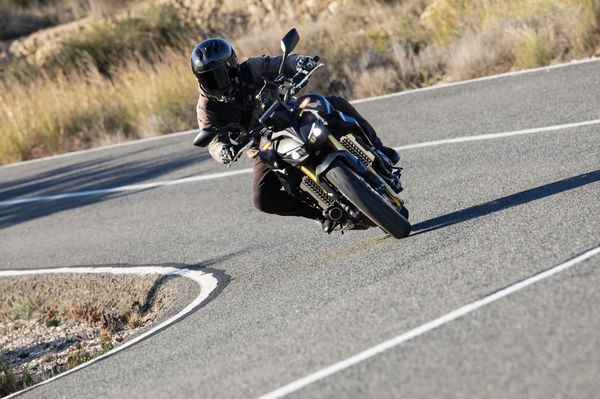
What’s it like to ride
Pulling out of the hotel as we begin the launch ride, my first impression is that this engine does not feel soft, detuned, or pegged back in any way. It’s almost uncharacteristically punchy for a Japanese inline four-cylinder, and even in the Road riding mode, the throttle feels snappy and extremely direct. I’m also noticing a lot of engine braking, which is, again, unusually strong for a bike of this configuration. On that front I’m going to have to like it or lump it, as to reduce the amount of off-throttle deceleration I’ll need to pull over and dig down into the TFT a little.
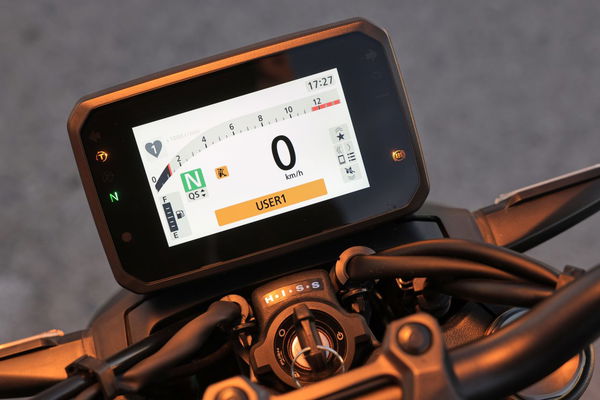
As for the rest of the bike, it’s all very promising, even on the less inspiring roads that precede the twisty mountain passes that await us. The agility of the bike stands out hugely, almost to the point where I have to recalibrate my riding style to get the most out of it. Shifting my bodyweight and leaning on the bars even slightly has the bike dropping on its side incredibly quickly, yet at motorway speeds it feels nicely composed.
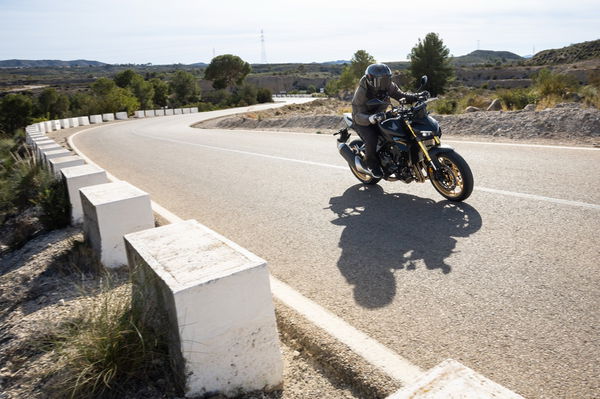
After a bit of roundabout bashing, we finally hit the mountains, and despite the chilly start, the roads are beginning to warm and the CB1000 is starting to come into its own. The front end is incredible, and I’m seemingly able to ask it for anything, any line at any speed, and it’ll confidently oblige. It’s rolling on Bridgestone S22s, and while they aren’t the latest or greatest hoops from the Japanese brand, I’ve got no complaints with them on this road in these conditions.
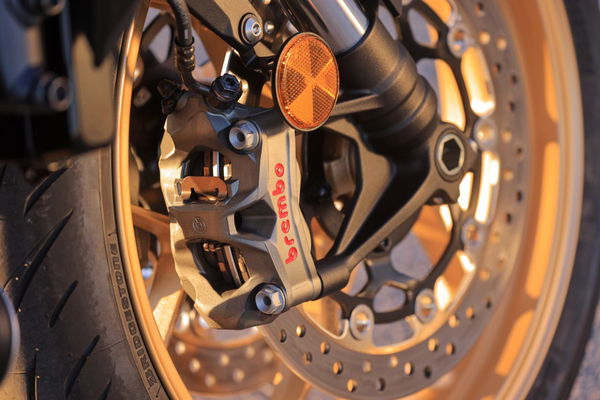
One of the other defining features of the SP variant of the bike is the inclusion of Brembo Stylema calipers which trump the Nissin items found on the stock bike. As you’d expect the lever feels is nicely progressive and I only need one or two fingers on the lever given the amount of braking power there is on tap. The ABS system, while not IMU controlled, also works well, and isn’t overly intrusive or inaccurate when it is triggered.
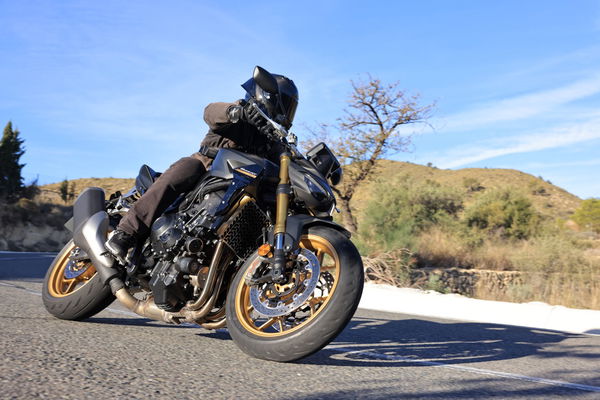
With the first photo and video stop complete, I take the break in proceedings as a chance to delve into the dash. It’s a super easy system to use, and Honda has thankfully kept the lefthand switchcube free from any clutter. After flicking between the Road and Sport riding modes already today, I jump into one of the custom modes to see if I can reduce the slightly choppy throttle feeling. With no chance to change the throttle map, I opt instead to reduce the engine braking, hopefully ironing out that slightly clumsy on/off throttle sensation. The result of this is a bike that feels much more comfortable when rolling off the power, although for me the throttle connection is still slightly too aggressive for my liking. As flies in the ointment go, it’s definitely not a biggy! Had I had more time on the bike, I’m sure I’d have gelled with the throttle connection, and for many riders, the snappy and direct throttle will be part of the bike's appeal.
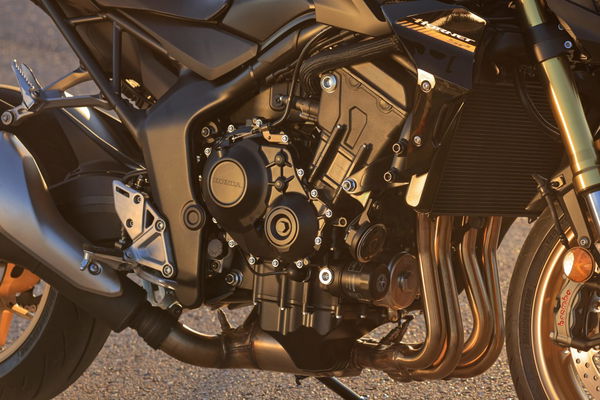
Another big draw for many future CB1000 Hornet owners will be the chance to bag an engine that formerly resided in the sporty chassis of the CBR1000RR Fireblade. Yes, it’s from an older generation 2017 bike, and yes, it has been detuned and internally altered. But none of those alterations or changes have negatively impacted the engine in any way. With shorter ratios in the slick six-speed slipper assist-equipped gearbox, the engine feels extremely eager to pull, even from low in the rev-range where an inline four such as this could feel stifled. That’s not the case though, and instead of bogging when you ask for a handful of horsepower, the new Hornet just pulls fast and hard all the way through the rev-range. It’s an exhilarating and intoxicating engine, which is backed up by a deliciously naughty exhaust note that sounds almost too good to be Euro5+ certified.
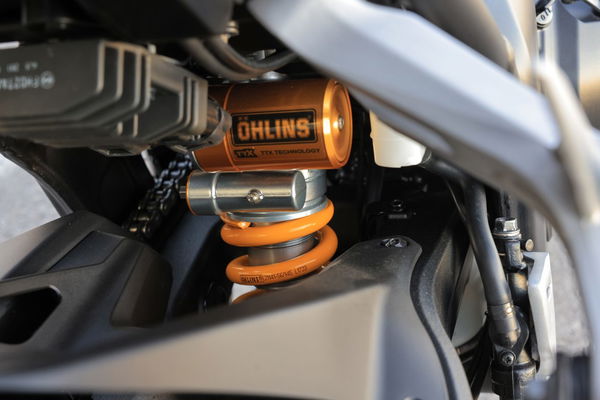
Another element of change for the SP is the Ohlins TTX36 rear shock absorber, which replaces the Showa item found on the stock bike. It’s obviously a premium bit of kit, offering support on corner exit without being harshly oversprung when contesting with potholes and bumps. Is it going to be a much higher-performing item than the Showa shock found on the stock bike? Probably not. Unless you are looking to take the bike to the track, that is, where the Ohlins kit will likely come into its own. The thing is, for an extra £1,000 you get the shock, the quickshifter, more peak power, the exhaust valve and the gold forks and wheels. Putting it simply you’d have to be a bit of a numpty to opt for the stock bike when you get so much more for so little outlay if you go for the SP.
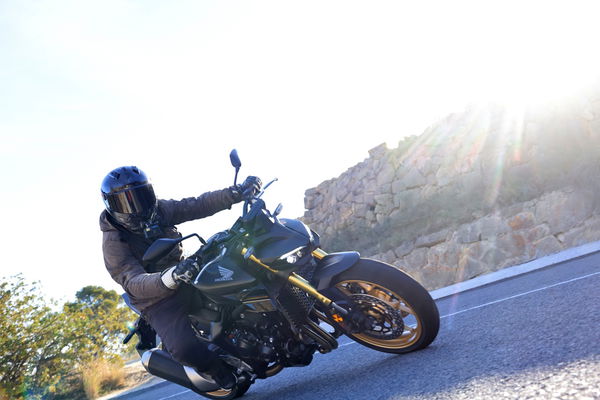
Are there any bad bits?
Aside from the very direct throttle map, which I’ve already covered, not hugely. The bike I’m riding is fitted with lovely-looking CNC machine footpegs and some vibes come and go as I move up through the rev-range. It’s not a huge issue, and when cruising at 70 to 75mph the vibrations disappear. It’s also worth noting that not all the bikes had the CNC pegs, with half the machine being fitted with the standard rubber-topped items. The journalists riding those bikes reported that vibrations weren’t an issue. The only other thing I’ve noticed is that very occasionally I’m triggering the quickshifter with the slightest involuntary touch of the lever. It’s not enough to actually force the bike to shift a gear, but it is enough to cut the power momentarily. As with the throttle connection, with more time on the bike, it’d likely become less of an issue and the sensitivity can be adjust via the TFT.
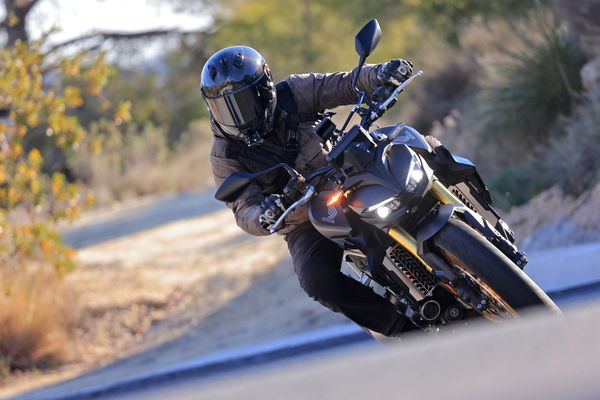
Should you buy the 2025 Honda CB1000 Hornet
To put it simply, the new CB1000 Hornet feels like the bargain bike of 2025, an early Christmas present for anyone looking to add a brilliant super naked to their garage this winter. It’s exceptional value, handles fantastically, sounds brilliant and, especially if you opt for the SP, has a high level of standard spec. I’m also of the opinion that it looks great, and probably the biggest compliment I can pay it is that it doesn’t look like a Honda. It’s aggressive without being exaggerated, and includes a level of fit and finish that gives you the impression that it is a premium bike, definitely worth much more than the sub-£10k asking price.
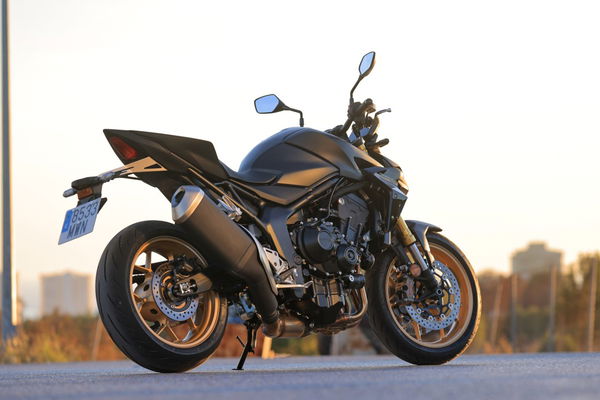
But there is something else that the Hornet does superbly well, and it's a trick I’m not sure I’ve experienced on any other modern-era Hondas. It’s that this bike feels like a fun bike. By that I don’t mean it’s a bike that you can have fun on while you ride - as pretty much any bike can do that. What I mean by that statement is that this feels like a bike that wants to have fun. It’s happy to pull wheelies, and slither into corners. It’s a seriously quick bike that doesn't take itself too seriously. I get the impression that making the rider smile from ear to ear while riding the new CB1000 was firmly on the Honda design team's to-do list. The fact that while they ticked that box they also created the best value super naked you can buy feels like a very happy accident!
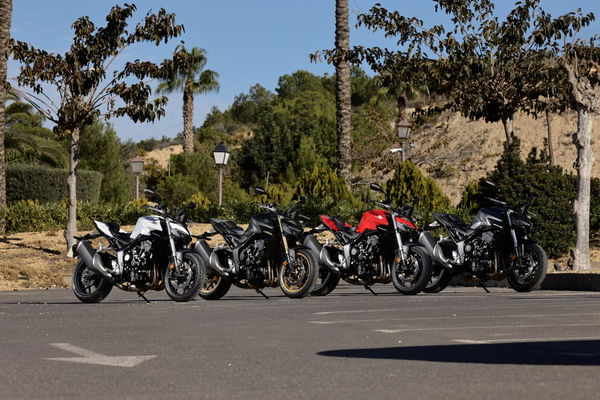
2025 Honda CB1000 Hornet spec
Engine | DOHC inline four-cylinder, 16-valve |
Power | 155bhp at 11,000rpm |
Torque | 78lb ft at 9,000rpm |
Compression ratio | 11.7:1 |
Gearbox | Six-speed manual |
Clutch | Slip/assist |
Quickshifter | Yes (optional on the stock CB1000) |
Brakes (f) | Brembo Stylema and 310mm disc |
Brake (r) | Nissin single-piston and 240mm disc |
ABS | Two-channel |
Suspension (f) | Showa Separate Function Forks Big Piston - fully adjustable |
Suspension (r) | Ohlins TTX36 shock - fully adjustable |
Weight | 212kg (with fuel and fluids) |
Seat height | 809mm |
Fuel capacity | 17 litres |
Wheelbase | 1,455mm |
Ground clearance | 135mm |
Price | £9,995 (price at launch for the SP) |
